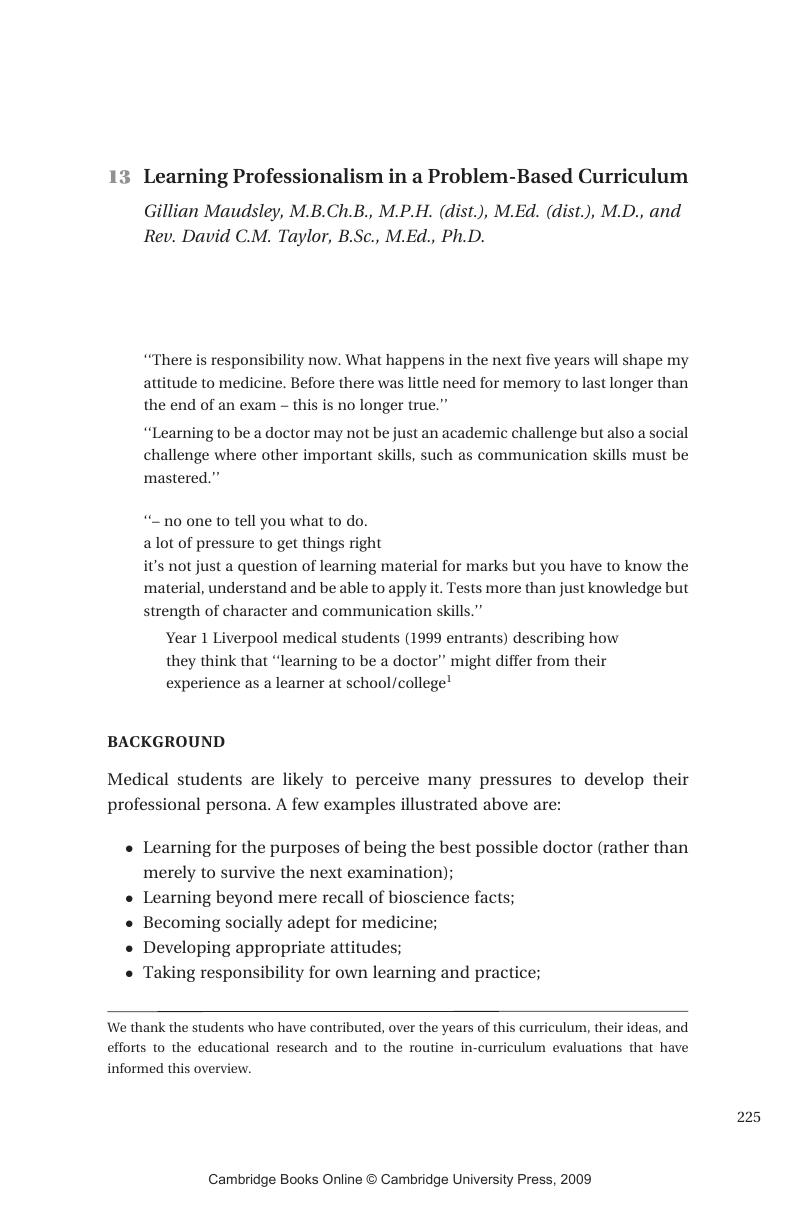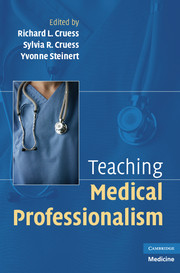Book contents
- Frontmatter
- Contents
- List of Contributors
- Foreword by William M. Sullivan
- Introduction
- PART ONE WHAT IS TO BE TAUGHT
- PART TWO THEORY
- PART THREE PRINCIPLES
- PART FOUR PRACTICE: CASE STUDIES IN TEACHING PROFESSIONALISM ACROSS THE CONTINUUM
- 12 Teaching Professionalism in a Traditional or Organ-Based Curriculum
- 13 Learning Professionalism in a Problem-Based Curriculum
- 14 Teaching Professionalism and Fostering Professional Values during Residency: The McGill Experience
- 15 Continuing Professional Development: A Focus on Professionalism
- APPENDIX A Definitions of Professionalism
- APPENDIX B Core Attributes of Professionalism
- APPENDIX C The Teaching of Professionalism: Vignettes for Discussion
- APPENDIX D A Matrix for “Matching” Teaching Methods to Attributes
- APPENDIX E Sample Grid for Use with Discussion of Vignettes
- APPENDIX F Sample Questions to Guide Discussion about the Social Contract: Small-Group Leaders' Guide with Suggested Responses
- APPENDIX G Professionalism Program for Residents: Suggested Outline for Small Group Facilitators
- APPENDIX H Sample Evaluation Form for Residents' Half-Day Program on Professionalism
- Index
- References
13 - Learning Professionalism in a Problem-Based Curriculum
Published online by Cambridge University Press: 01 September 2009
- Frontmatter
- Contents
- List of Contributors
- Foreword by William M. Sullivan
- Introduction
- PART ONE WHAT IS TO BE TAUGHT
- PART TWO THEORY
- PART THREE PRINCIPLES
- PART FOUR PRACTICE: CASE STUDIES IN TEACHING PROFESSIONALISM ACROSS THE CONTINUUM
- 12 Teaching Professionalism in a Traditional or Organ-Based Curriculum
- 13 Learning Professionalism in a Problem-Based Curriculum
- 14 Teaching Professionalism and Fostering Professional Values during Residency: The McGill Experience
- 15 Continuing Professional Development: A Focus on Professionalism
- APPENDIX A Definitions of Professionalism
- APPENDIX B Core Attributes of Professionalism
- APPENDIX C The Teaching of Professionalism: Vignettes for Discussion
- APPENDIX D A Matrix for “Matching” Teaching Methods to Attributes
- APPENDIX E Sample Grid for Use with Discussion of Vignettes
- APPENDIX F Sample Questions to Guide Discussion about the Social Contract: Small-Group Leaders' Guide with Suggested Responses
- APPENDIX G Professionalism Program for Residents: Suggested Outline for Small Group Facilitators
- APPENDIX H Sample Evaluation Form for Residents' Half-Day Program on Professionalism
- Index
- References
Summary

- Type
- Chapter
- Information
- Teaching Medical Professionalism , pp. 225 - 245Publisher: Cambridge University PressPrint publication year: 2008



